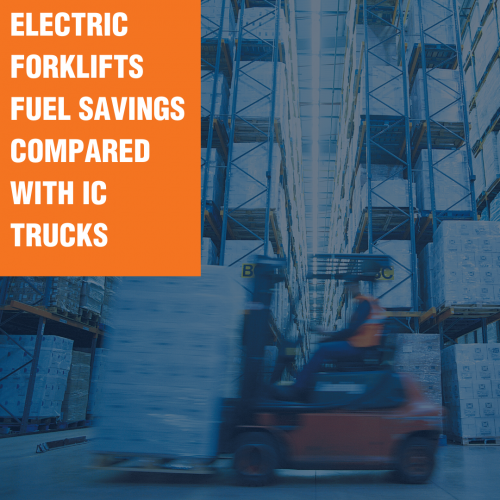We use cookies to make your experience better. To comply with the new e-Privacy directive, we need to ask for your consent to set the cookies. Learn more.
Electric Forklift Fuel Savings Compared with IC Trucks

We do know that electric forklifts are increasingly becoming the material handling engines of choice for facility managers. A new generation of AC-powered electric forklifts is expanding lift capacities for newer machines over their DC-powered predecessors. In fact, electric forklifts are now available with capacities of up to 92,000 pounds, right up there with the heftiest gas-powered lifters.
For several years now, electric forklifts have retained a firm hold on 65 percent of the total lift truck market. But there are many reasons for companies to choose electric forklifts over IC trucks: cleanliness in food-handling applications, the safety of operating them indoors, increasingly aggressive environmental goals. Where does the cost of operation fall into this equation?
Calculating Fuel Costs for Forklifts
According to industrial battery dealer Enersys’ online cost comparison tool, a fleet of 10, 5,000-pound-capacity lift trucks will burn through $562 of propane fuel in a month. (This calculation assumes a static price of propane, set at $2.50 per gallon.) With electric lift trucks, the price to power the fleet will only be $90 per month, assuming an electricity cost of 10 cents per kilowatt-hour.
That cost differential actually surpasses the claim of 80 percent savings for electric versus propane-powered trucks; in fact, it reaps fuel savings of 84 percent. Electric forklifts also carry lower maintenance costs than IC trucks.
Given these considerations, it seems clear that a facility manager looking for the lowest-possible cost of ownership across the lifetime of a forklift fleet would be wise to choose electric power.
Additional Costs Associated with Electric Forklifts
Of course, there are other factors to consider, as IC-truck proponents will be quick to point out. Electric forklifts tend to cost more at the outset than IC trucks. And then there’s the matter of the battery room.
Changing batteries takes too long, say some advocates of IC lift trucks. The battery room occupies too much floorspace, they say. These and other protests can all be silenced with efficient, low-footprint battery room infrastructure.
Take an Operator Aboard Battery Extractor System , for instance. These comprehensive battery room solutions build up to four stacks of battery stands vertically, greatly reducing footprint. Battery System Stands can include integrated charger shelves. The Battery Extractor itself can sail down the line, selecting a fully charged battery. The full change-out only takes a few minutes.
In short, the claim that electric lift trucks can create fuel savings of 80 percent compared to IC trucks is accurate enough; but in order to realize the full benefits of electric forklifts, you need the right equipment in the battery room.
References:
Bond, Josh. “Lift Truck Tips: Manufacturers lead charge toward electrified future.” MMH. Peerless Media, LLC, 17 Jan. 2018. Web. 18 Oct. 2019.
“C2E: Calculate.” Convert2Electric. EnerSys, n.d. Web. 18 Oct. 2019.
